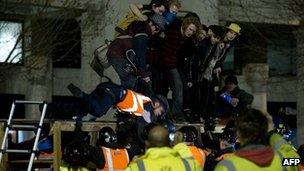St Paul's protest: Occupy London camp evicted
- Published
- comments

Some protesters erected a makeshift barricade, but most moved on peacefully
Police and bailiffs have evicted anti-capitalist protesters and removed tents from the Occupy London camp at St Paul's Cathedral.
The operation, which began just after midnight, was mostly peaceful but there were 20 arrests.
A St Paul's spokesman said: "We regret the camp had to be removed by bailiffs."
The City of London Corporation said it "regretted" that it had become necessary to evict the protesters.
Occupy London, which campaigns against corporate greed, set up the camp on 15 October.
The campaigners were refused permission to appeal against a High Court decision to allow their eviction to proceed.
The Rev Giles Fraser, who resigned as canon chancellor of St Paul's in support of the protesters, said: "This is a sad day for the Church.
"Riot police clearing the steps of St Paul's Cathedral was a terrible sight."
The St Paul's spokesman said: "In the past few months, we have all been made to re-examine important issues about social and economic justice and the role the cathedral can play.
"We are fully committed to continuing to promote these issues through our worship, teaching and Institute."
Protesters in the square outside the cathedral stressed their action was far from over, but most did not resist police and bailiffs as they removed tents and other equipment from the site.
A handful defied police by erecting a temporary structure from wooden pallets in the square outside St Paul's but the platform was eventually dismantled.
The High Court decided last week that the City of London Corporation's move to evict the camp was "lawful and justified".
The corporation was granted orders of possession and injunctions by the court.
TheCourt of Appeal's decision not to allow an appeal, externalmeant the corporation was free to clear the site.
George Barda, one of the five protesters who appealed against the High Court's decision, told the BBC he had "mixed emotions".
But the 36-year-old said: "It's not the beginning of the end, it's the end of the beginning."
He said the eviction did not spell the end of the protest.
"The corporation made it very clear that they have nothing supposedly against protest, assembly, free speech in this area, just the tents and the bedding that have now been removed," he added.
Following the eviction, Occupy London protesters moved to Salvation Army offices by Millennium Bridge, but City of London Police officers moved them on.
Some of the protesters moved to a disused building in Featherstone Street, Islington, which Occupy protesters had called the School of Ideas.
However, the protesters were evicted and the building was being bulldozed on Tuesday.
Dozens more protesters moved to Finsbury Square, Islington, where a separate Occupy camp has been set up for a number of months.
Fences were put up around St Paul's as a City of London cleaning team began a deep clean of the area.
'Maintain order'
The City of London Corporation said in a statement: "The City of London Corporation has begun to enforce the High Court orders for the removal of the tents and equipment outside St Paul's.
"We regret that it has come to this but the High Court Judgment speaks for itself and the Court of Appeal has confirmed that judgment.
"High Court enforcement officers employed by the City of London Corporation are undertaking the removal with the police present to ensure public safety and maintain order.
"We would ask protesters to move on peaceably.
"The City of London Corporation is ensuring vulnerable people are being helped and supported to find appropriate accommodation in partnership with Broadway, a charity for the homeless."
A statement from City of London Police said: "At 12.10 tonight, bailiffs employed by the City of London Corporation began enforcing a High Court order for the removal of tents and equipment outside St Paul's Cathedral.
"Officers from the City of London Police supported by Metropolitan Police are present to ensure public safety, maintain order and facilitate lawful protest."
London Mayor Boris Johnson said: "I'm glad that finally the law has taken its course.
"My interest is in the economic interest of the city and I want to make sure the businesses in that area can flourish."
- Published28 February 2012
- Published22 February 2012